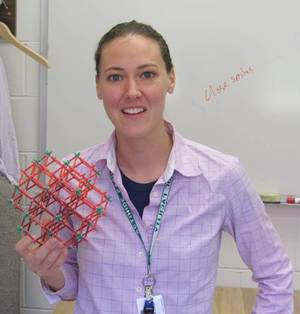"Actinide Structural Chemistry: Understanding the Behavior of the 5f elements," by Karah Knope

Abstract
Structural chemistry has played an important role in our understanding of the chemical and physical properties of the actinides. Yet our understanding of the structure, bonding, and reactivity of actinide complexes, clusters, and extended networks still lags behind that of the rest of the Periodic Table. This lack of structural and chemical information, particularly for the tetravalent actinides, has resulted in large discrepancies in thermodynamic data, significant challenges in separations chemistry, and unexpected mobility in the environment. Motivated by these considerations as well as a recognition that the overall chemical behavior of a metal ion in solution depends largely on the species it forms, their stability and reactivity, our group has been examining the solution and solid state structural chemistry of actinide species that persist in aqueous solution and/or precipitate into a solid phase. Using different synthetic approaches, spectroscopic and scattering techniques, and solid state structural characterization methods we are unravelling the (often competing) effects of metal ion hydrolysis and condensation, ligand complexation, noncovalent interactions (e.g. hydrogen bonding), and solution conditions on actinide species formation and reactivity. Presented here will be an overview of recent results in carboxylate ligand systems that highlight the delicate interplay that exists between hydrolysis and condensation and ligand complexation. The role that non-coordinating cations have on phase formation as well as trends in structural periodicity that are observed from Th-Pu will also be discussed.
Biography
Karah E. Knope earned her B.A. in chemistry from Lake Forest College and her Ph.D. in Inorganic Chemistry from The George Washington University. She joined the Heavy Element and Separation Sciences group at Argonne National Laboratory in 2010 as a postdoctoral research associate and in 2012 accepted a staff position as an Assistant Chemist in the Chemical Sciences and Engineering Division. In August 2014, she joined the faculty at Georgetown University as the Clare Boothe Luce Assistant Professor in chemistry. Her research group is broadly interested in actinide structural chemistry and the factors that govern the formation, stability, and reactivity of actinide complexes and clusters both in solution and the solid state.
Seminar sponsored by the Department of Civil and Environmental Engineering and Earth Sciences
Downloads:
Knope Flyer